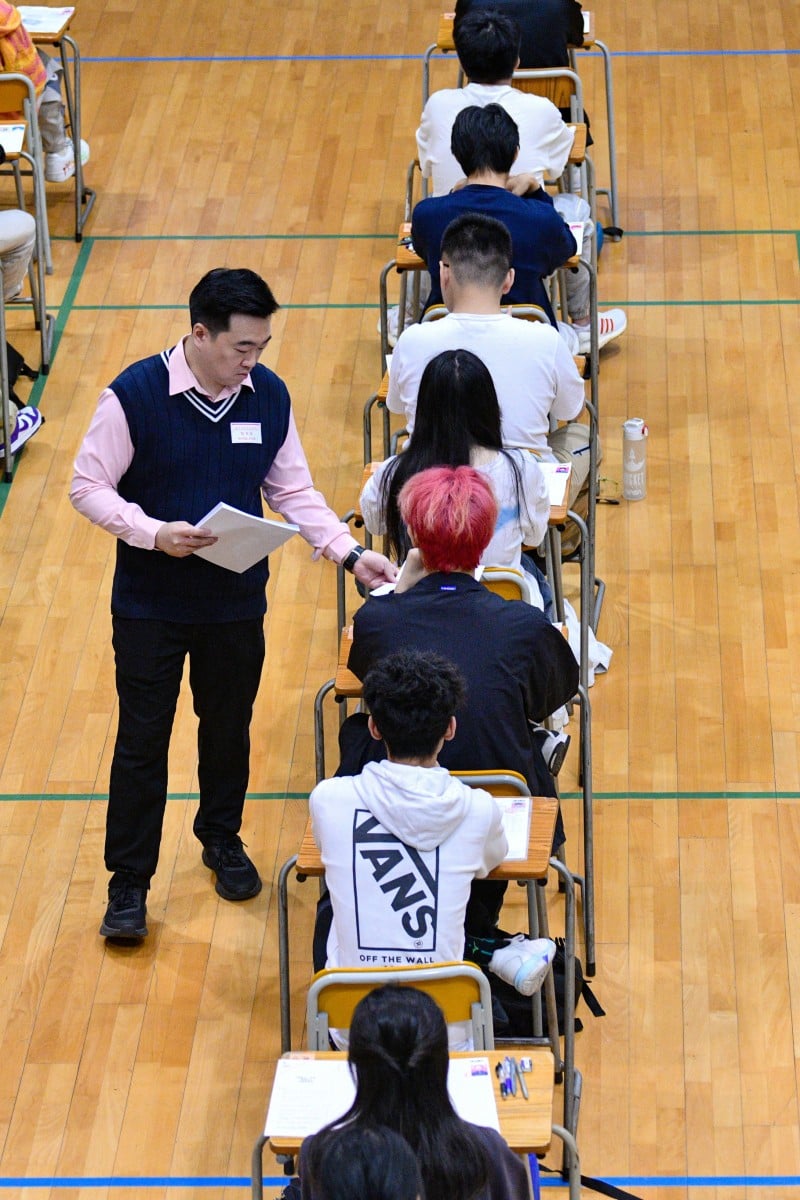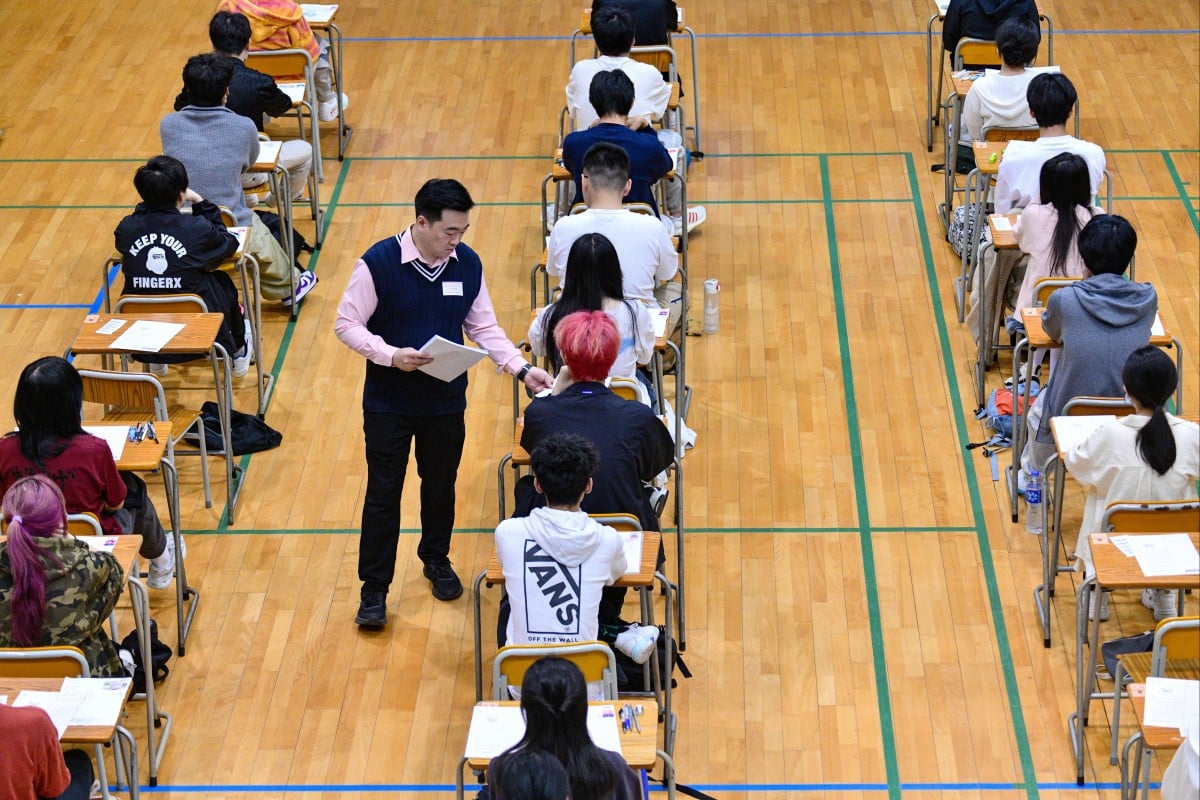
- Education Bureau data indicates a success rate nearly three times higher for Chinese-speaking pupils
- Experts attribute inadequate Chinese language skills as a hindrance; appeal for non-Chinese speakers to be placed in mainstream kindergartens
 Low number of Hong Kong pupils from ethnic minority backgrounds secure government-funded university places after DSE exams over last five years. Photo: Handout
Low number of Hong Kong pupils from ethnic minority backgrounds secure government-funded university places after DSE exams over last five years. Photo: HandoutJust one in 10 Hong Kong pupils from ethnic minority backgrounds who studied the city curriculum secured a government-funded public university place in the past five years. This is well below the about 25 per cent recorded for students from the majority population.
Ethnic minority figures and teachers said the government statistics underlined that low proficiency in Chinese language was the main reason for consistently low admission rates for ethnic minority candidates over the years.
They appealed for non-Chinese speaking children to be placed in mainstream kindergartens and for effective supervision of the funding earmarked to help them.
Education Bureau figures obtained by the SCMP showed that between 106 and 149 non-Chinese speaking children sitting the city’s university entrance exams obtained a government-funded university place each year over the past five years.
There were between 1,094 and 1,245 ethnic minority children who sat the Diploma of Secondary Education (DSE) exams every year over the same period.
The figures mean one in 10 ethnic minority pupils who took DSE exams in Hong Kong secured a subsidised place over the past five years. About 2.7 Chinese-speaking pupils out of 10 who took DSE exams obtained a government-funded place at a public university – a success rate nearly three times higher than their contemporaries from ethnic minority groups.
A total of 15,000 government-funded university places are offered every year.
Non-Chinese speaking pupils are city residents, but where the language used at home is not Chinese.
Lai Chun-kit, the vice-principal of Hong Kong Taoist Association The Yuen Yuen Institute No 3 Secondary School, where half the pupils are from ethnic minority backgrounds, said the motivation to learn among the group had been undermined since they were in primary schools.
“Their level of Chinese is low, but almost all aided and government primary schools were using Chinese to teach subjects other than English,” he added. “Their academic results could only allow them to be admitted by secondary schools using Chinese as a medium of instruction.”
Hong Kong schools that teach in English are more popular and so harder to get into.
The social struggles of ethnic minorities
Lai’s school is among those allowed by the Education Bureau to use English to teach ethnic minority pupils so they have a better understanding of their subjects.
He added some universities in the city did not give the same weight to alternative Chinese language assessments as they did to the DSE exams, which were regarded as more difficult.
“Even if you got the top grade of those [alternative] tests, it was just regarded as a pass,” he said.
Lai added the education of some ethnic minority children was affected by low self-esteem after they had faced a variety of levels of discrimination in a Chinese-dominated community.
“The students are quite affected by their seniors in their community,” Lai explained.
“It makes them only eye jobs like delivery riders, construction workers and security guards. We have been teaching students they should aim higher.”
Mohammad Rohail, a 24 year-old Hongkonger of Pakistani ancestry who teaches English at Lai’s school, which he also attended, was among the exam candidates who succeeded in obtaining a government-funded university offer of a place at the University of Hong Kong in 2018.
He secured 26 marks in the DSE exams and got grade A* in GCSE Chinese, which is a test sat mostly by non-Chinese speaking students in the city as an equivalent to DSE Chinese.
Rohail was born and brought up in Hong Kong after his father came to the city in the 1980s. He said all his preschool classes were taught in Cantonese, which gave him a good foundation, although it was a difficult language to learn.
But he said many ethnic minority toddlers were rejected by mainstream preschools and missed their first step towards proficiency in Chinese. Rohail said they ended up in preschools that mainly catered to children from ethnic minority backgrounds, which made it harder for them to learn Chinese.
“It’s my firm belief that if you’re not exposed to Chinese from kindergarten, it becomes very difficult for you to adapt and learn Chinese when you’re older,” he added.
Rohail said, like many children from low-income ethnic minority families, he could not afford to sign up for tutorial classes, and his studies were affected because he had to take a part-time job in a fast-food shop every day after school since Form Four.
Hong Kong ethnic minority children with special needs face delayed diagnosis
“During the summer holiday before Form Five, I realised this is my chance to climb up the social ladder to improve my family’s situation, and I must take it now,” Rohail said. “I remember I started taking my studies seriously.”
He added ethnic minority pupils in Hong Kong still faced the problems he faced as a schoolboy.
Manoj Dhar, who co-founded IBEL, an NGO designed to help ethnic minority communities learn Chinese, said that because the government had increased resources in recent years to boost non-Chinese speaking students’ proficiency levels in the language, schools that received subsidies should be closely supervised.
“Their funding must be on a performance-based matrix and concrete deliverables and not just on the non-Chinese speaking children headcount that the schools have enrolled,” he said.
The government earlier revealed that expenditure to support non-Chinese speaking students from early childhood to secondary education in the 2022-23 school year was about HK$590 million (US$75.5 million), 140 per cent more than the HK$244 million allocated in 2015-16.